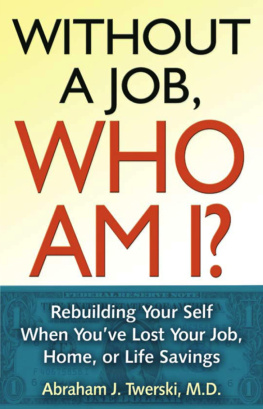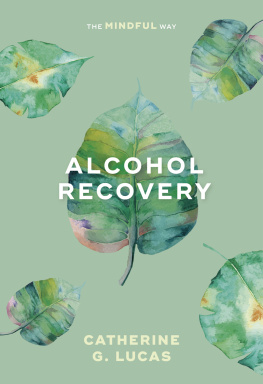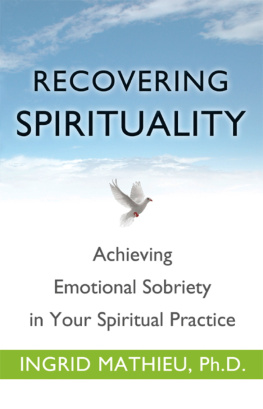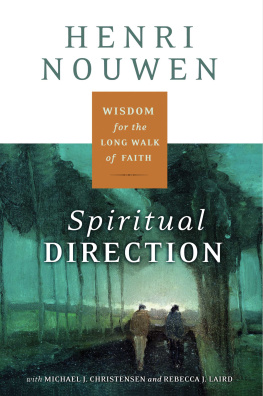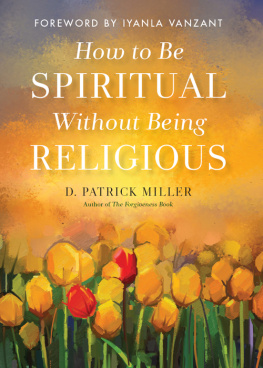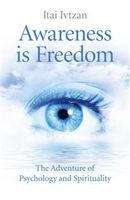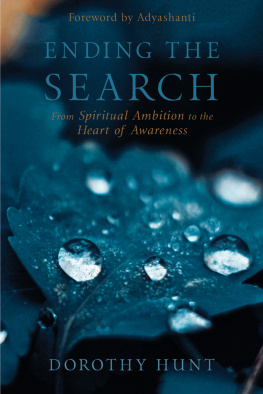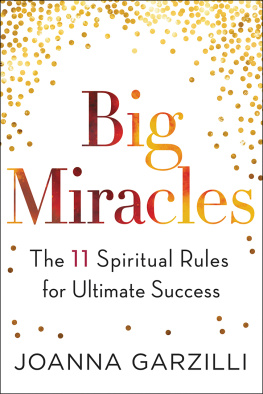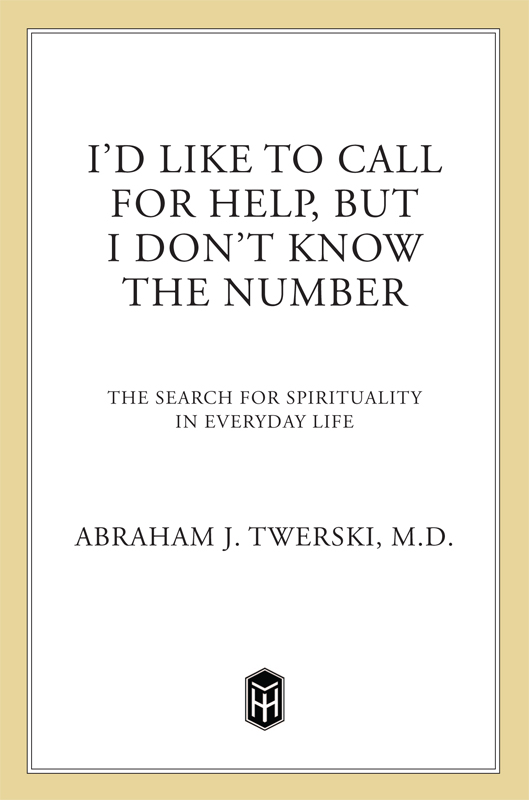Contents
Guide

The author and publisher have provided this e-book to you for your personal use only. You may not make this e-book publicly available in any way. Copyright infringement is against the law. If you believe the copy of this e-book you are reading infringes on the authors copyright, please notify the publisher at: us.macmillanusa.com/piracy.
Contents
Friends, staff and clients of Gateway Rehabilitation Center past, present and future
INTRODUCTION
Spirituality in Recovery
The way the concept of spirituality is approached in this book requires some explanation, and it might be best explained by relating how I came to deal with it.
My first occupation was as a cleric. I had grown up under the tutelage of my father who was a rabbi extraordinaire, and I had hoped to follow in his footsteps, to provide counseling for the bewildered and comfort for the suffering. However, I entered my calling in the post-World War II era, when psychiatry and psychology were in their apogee, and when man, intoxicated with the grandiosity of his epochal scientific advancesantibiotics and other wonder drugs on the one hand and nuclear energy on the otherentered into the God is dead era. These unprecedented productions of the human genius gave rise to an attitude that man himself is indeed omnipotent, and there was therefore no room for two omnipotent beings. Psychiatry and psychology, having the imprimatur of science, became the basis of human conduct and the key to the attainment of happiness.
It appeared to me that my function as a rabbi would not be at all like that of my father. Rather, I would be relegated to conducting services, performing marriage and burial rituals, and preaching. In short, to be a functionary. This was not what I had envisioned for myself. If I wished to be a counselor or a comforter, I would have to utilize the authoritative methods of science, and this called for training in medicine and psychology to become a psychiatrist.
Four years of medical school at Milwaukees Marquette University and a year of internship at that citys Mount Sinai Hospital qualified me to practice medicine, and three years of post-graduate psychiatric training at the University of Pittsburghs Western Psychiatric Institute provided me with the basis for diagnosing and treating emotional and mental disorders.
While psychiatric training brought me in direct contact with much human suffering and with various complex theories on the formation of thought and emotion, midway in psychiatric training I began treating a woman who profoundly affected my career.
I had been assigned one day to duty in the walk-in-clinic, where patients with an urgent need to consult a psychiatrist could be seen without a previous appointment. One of the clients that day was Isabelle, a woman in her sixties, whose case helped fashion my professional career. Isabelle had developed a dependency on alcohol early in life and, being the daughter of an Episcopalian priest, she alienated the family by her unacceptable conduct. Her husband became intolerant of her drinking and made it clear that the marriage could not continue unless the alcohol was eliminated. I knew that I could not stop drinking, Isabelle said, and that I was not being a good wife or mother. She complied with her husbands request for a divorce, and never saw him or her child again.
Being a very attractive woman, her companionship was widely sought, and her escorts provided her with an abundance of alcohol. As the drinking began to take its inevitable toll, she began a gradual descent on the social ladder, eventually culminating in a skid-row existence. For some twenty years she was in and out of hospitals for drying-out after alcoholic binges, and in the process made the perfunctory visits to Alcoholics Anonymous meetings that were required by the people who ran the hospital drunk-tank.
At age 56, Isabelle did a rather strange thing. She contacted an attorney friend and insisted that he have her committed to the state mental hospital for one year as an inebriate. Upon completion of this year of enforced abstinence, Isabelle found herself a job as a housekeeper, and became an active participant in Alcoholics Anonymous. When she came for her psychiatric consultation, she was in her fifth year of sobriety.
I cannot recall the initial reason Isabelle gave for requesting psychiatric treatment. Whatever it was obviously did not impress me. I was fascinated, however, by her decision to place herself in a mental hospital for a full year in order to enable her life to take a new direction. As a fledgling psychiatrist, I was deeply interested in human motivation, and I was puzzled by what could have motivated this woman to take so drastic a step. What was there to be gained by being sober? Certainly not reconciliation with her family, because they had written her off as dead, and did not acknowledge any of her overtures, even after she had been sober for several years. Curious to discover the source of her motivation, I encouraged Isabelle to continue in psychotherapy, and so began a relationship of thirteen years duration.
Isabelle frequently referred to her participation in Alcoholics Anonymous, of which I knew next to nothing. This further aroused my curiosity. In medical school, treatment of alcoholism had not even received mention because it was assumed there was no treatment. The medical students contact with an alcoholic occurred when some medical crisis consequent to drinking compelled the emergency room staff to admit the individual. The doctors role was to pull the patient through the crisis and send him out to the inevitable return to drinking. Since no courses on alcoholism were included in the psychiatric curriculum either, it was evident to me that psychiatry had nothing to offer these incorrigible drinkers. Yet, here was a group of people who had somehow found a method of achieving what the best minds in psychiatry could not achieve. In an effort to discover the therapeutic secrets of AA I began to attend their meetings.
Had I not been a cleric earlier, I would probably not have been as deeply impressed with AA. However, two features of this program had a profound impact upon me.
Whereas all people are equal in the eyes of God, this lofty concept cannot always be implemented in institutionalized religion. Most religious denominations have buildings, places of worship. A building costs money, as does its operation and maintenance. A church or synagogue requires a staff, whose livelihood must be provided. In short, any religious institution has a budget which it must meet, and invariably this is achieved by contributions from the membership.
This creates a problem. A very affluent member may contribute a major portion of the budget, while someone of modest means may be able to make only a small contribution. While rich and poor are equal in the eyes of God, the cleric may be faced with the reality that he cannot risk offending an affluent member upon whose contribution he must so heavily rely. Sometimes even the most idealistic cleric may not be able to avoid this favoritism, which is, at least in theory, incompatible with the principles of religion.
It was therefore a novel and refreshing experience to discover the egalitarianism in AA. In the meeting rooms, all are equal. The money and prestige of the affluent can buy them nothing in AA. I recall one AA meeting where two women, Nancy and Edith, were engaged in a discussion, sitting side by side, each holding a cup of coffee and a doughnut. Nancy had come to the meeting in her luxury automobile, while Edith had to have the group secretary sign a slip for her so that she might recover the bus fare from the welfare agency, because otherwise she could not afford to come to meetings. Nancys wealth could not buy her any special privileges in AA, because there were none to be had. In that meeting room these two strikingly different individuals were two suffering human beings trying to restore a degree of sanity to their lives.


